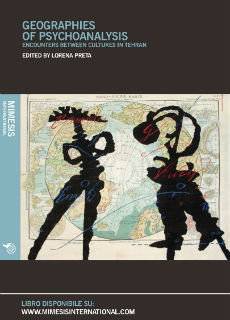
A cura di Lorena Preta (2015)
Geographies of Psychoanalysis
Encounters between Cultures in Tehran
Edizioni Mimesis
Can psychoanalytical hypotheses have a universal value? Can they describe the same – or a similar – psychic dynamic for any human, regardless of the historical, social and cultural context? Can psychoanalysis help with mental suffering in different realities?
In our times, the questions psychoanalysis has to face are very complex. The modern world is dominated by technology that subverts the perception of the body, by new families and group organization and by global violence that enforce a changed geometry of the mind.
The answers to these new situations differ from country to country regardless of the uniformity brought about by globalization. Consequently, the responses and role of psychoanalysis change across different nations.
Presenting their different experiences and problem areas, the autors of the essays have laid out a map which is different from those geographical and geopolitical ones that we all know.
It seems to be clear that the boundaries of both internal and external space are subject to continual adjustments and re-definitions.
In this sense psychoanalysis is not only a science of the subject but a search for the link between diversities. Diversity of psychic organization at its various levels, diversity among groups and cultures in the world.
For this reason psychoanalysis provides a continuously updated map of the psyche, which not only defines known boundaries but attempts to map even areas that are yet to come.
Contributors: Tiziana Bastianini, Felix de Mendelssohn, Sophie de Mijolla- Mellor, Anna Ferruta, Gohar Homayounpour, Mariano Horenstein, Sudhir Kakar, Alfredo Lombardozzi, Lorena Preta, Silvia Ronchey
